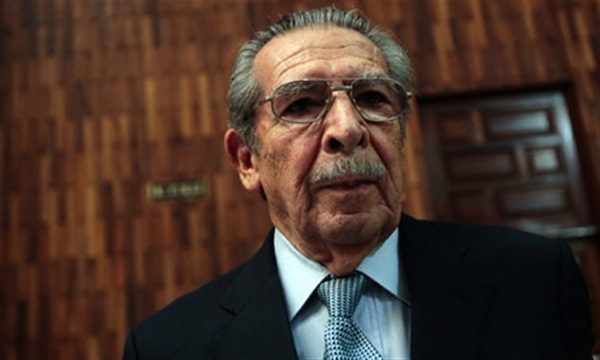Image courtesy The Guardian
On 10 May 2013, former Guatemalan dictator Efraín Ríos Montt was found guilty of genocide and crimes against humanity and sentenced to 80 years in prison. It was the first time that an ex-head of state had been convicted for genocide by a court in his or her own country. The case is of international importance, including in Sri Lanka.
President Ríos Montt had ordered the deaths of 1,771 people of the Ixil Maya ethnic group in 1982 and 1983. He was in power during the bloodiest phase of a civil war that lasted from 1960-1996, during which an estimated 200,000 were killed and 45,000 more “disappeared”. Others were raped, tortured in other ways or driven from their homes.
While mass murder and ethnic cleansing took place in the countryside, in the cities trade unionists and student leaders were seized by the security forces. The military were supposedly battling left-wing guerrillas but civilians suffered in huge numbers, sometimes at the hands of brutal paramilitary groups working alongside the armed forces.
Some Guatemalans, especially in the ruling elite, would rather have avoided the trial and glossed over past human rights abuses. But there were cheers in the courtroom in Guatemala City when Judge Jazmín Barrios read out the sentence. As 42-year-old Elena de Paz Santiago, one of those who testified, had said of the dictator, “He gave the order.” She was just 12 when she and her mother were taken to an army base and raped. The soldiers released her but she never saw her mother again.
The dead cannot be brought back to life nor can all the mental and physical scars of survivors be healed. However they have received some justice, and the message has been sent out that everyone, of whatever ethnic group or social class, deserves to be protected and treated with respect.
In South Africa, the quest for justice after apartheid ended took a different form. A Truth and Reconciliation Commission was set up which heard from the victims of human rights abuses. Some of those guilty were spared punishment if they confessed what they had done. However there too those guilty of terrible crimes, even if supposedly carried out in defence of the state, were finally held to account, and families were able to find out what had happened to their loved ones. It was an opportunity for both the violent and victims of violence to tell, and hear, the truth.
In other countries too, past abuses which have gone uncorrected still cast a shadow over the present. In Sri Lanka, between the late 1970s and early 1990s, numerous people died or had their lives shattered. The security forces and their paramilitary allies slaughtered huge numbers and abused others or drove them from their homes and livelihoods. Others suffered and sometimes died at the hands of the Tigers, other Tamil nationalist groups and the Janatha Vimukthi Peramuna (JVP), who used their power to violate the safety, dignity and freedom of others.
Many Sri Lankans remain in denial about the horror of those years and resist calls to unearth (sometimes literally) the evidence. Some, obviously, are fearful that what they – or those close to them – did, or failed to do, will be exposed, while others may prefer to shy away from confronting the scale of suffering. The fact that certain leading figures in the government and opposition may be implicated has added to the pressure to let the past stay buried.
However this refusal to get to grips with what happened is not only unjust to the dead, the bereaved and the traumatised but may be largely to blame for the massive violence that has taken place in twenty-first century Sri Lanka and ongoing ethnic, religious and social divisions. What is more, all civilians are at risk when the state is regarded as unaccountable to anyone, able to torture, burn and kill with impunity.
In Guatemala and beyond, the process of unearthing the past and acknowledging former wrongs is sometimes painful. But unless this is done, there is little chance of healing wounds and building a truly just and peaceful society.

